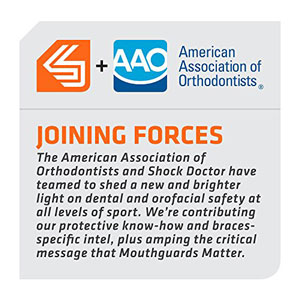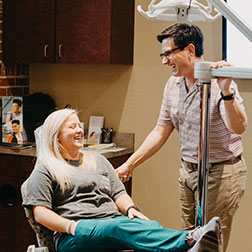
Types of mouthguards
It is important to choose the mouthguard that works for you. There are three basic types of mouthguards: the pre-made mouthguard, the “boil-and-bite” fitted mouthguard, and a custom-made mouthguard prescribed by your orthodontist. When choosing a mouthguard, Dr. Vargo recommends one that is tear-resistant, comfortable, well-fitted to your mouth, easy to keep clean, and allows you to breathe properly.
Pre-made mouthguards and boil-and-bite mouthguards are available for purchase at most sporting goods stores. Custom-made mouthguards are specially designed by your orthodontist to fit your mouth perfectly and provide the optimal level of protection against mouth injuries. If you wear braces or a retainer, it is necessary to wear a mouthguard while engaging in contact sports. Your doctor can show you how to properly wear a mouthguard and can assist you to choose the correct mouthguard that meets your needs.
Taking care of your mouthguard
It is important to care for all of your dental appliances weather they are braces, retainers, or in this case a mouthguard. Caring for your mouthguard includes storing it properly, maintaining it clean, and replacing it when necessary. Here are a few tips to keep your mouthguard in optimal working condition for as long as possible:
- Clean your mouthguard with a toothbrush and toothpaste flowing each use.
- Store your mouthguard in a protective case.
- Do not expose your mouthguard to any constant heat from the sun or hot water. Heat can melt or deform your mouthguard.
- Remember to replace your mouthguard at the beginning of every new sports season. If your mouthguard becomes worn or no longer fits, it is also time to replace it.
- Do not wear a retainer with your mouthguard. If you wear braces, your dentist will customize a mouthguard to protect your teeth and your braces.
- Do not chew on or cut pieces off of your mouthguard. Mouthguards come in different shapes and sizes; ask Dr. Vargo to help you select the right one for you.
- Bring your mouthguard to each dental checkup, Dr. Vargo will check to make sure it’s still in good shape and keeping your mouth safe.
Remember that sports-related injuries to the mouth and jaw are amongst the most common injuries suffered by athletes. It is our goal to help you avoid a sports-related injury that damages your smile. Be sure to ask Dr. Vargo about mouthguards at your next appointment.






